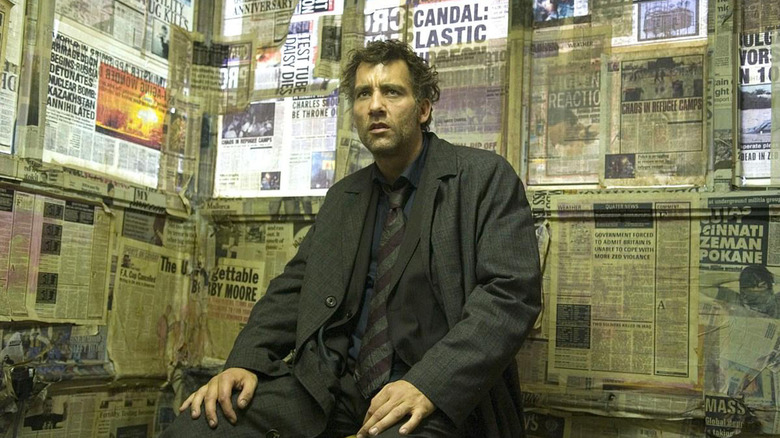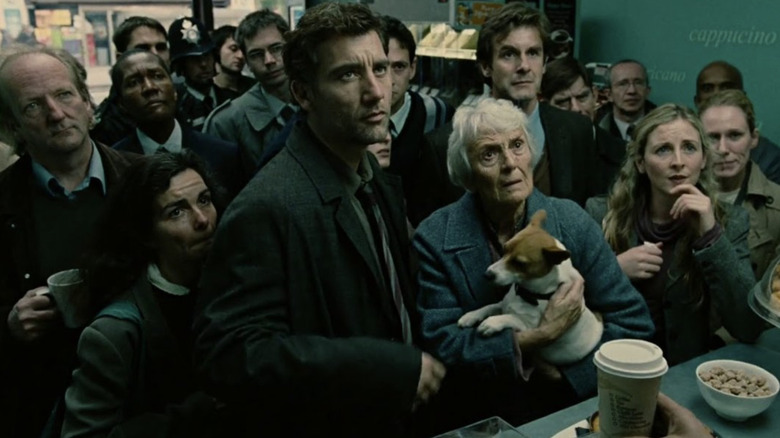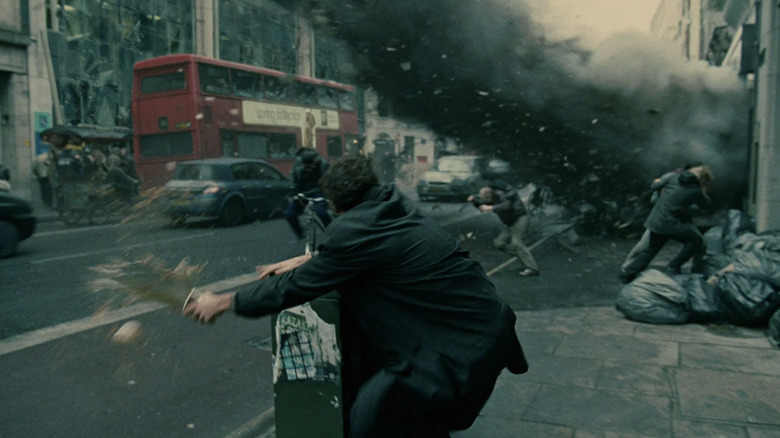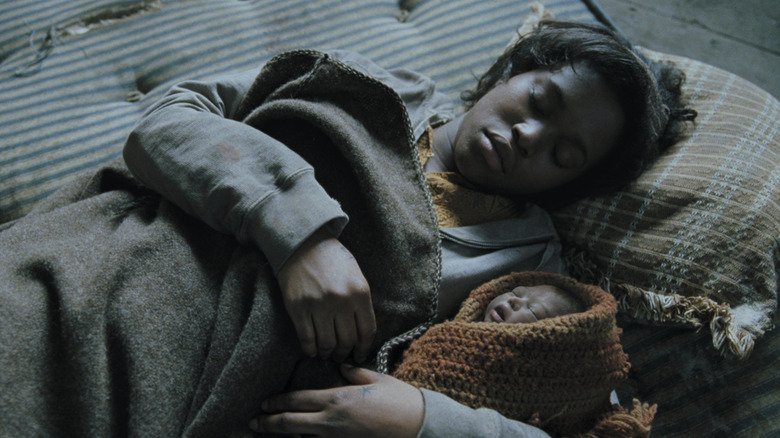Alfonso Cuarón Had Little Interest In Children Of Men Until Tragedy Struck
It's a common lesson learned amongst directors that any judgment call on a script isn't always final. One minute they're tossing it aside out of indifference or disgust and the next they're engrossed in its possibilities. Such was the tenuous relationship Alfonso Cuarón had with "Children of Men" when he was first pitched it. His feelings towards the screenplay — which was adapted from a 1992 sci-fi novel by P.D. James — could be described politely as more than a little apathetic.
Then tragedy struck, and suddenly Cuarón felt intimately connected to parts of the script he could remember. Yet instead of doing a straight adaptation of the novel, he decided to just use some of the core elements (character names, the infertility plot, and staging it in the U.K.) as a starting point. The movie Cuarón would eventually create both bombed at the box office and contained an abundance of differences from James' original story. Yet it remains today a frighteningly prescient reminder of a future that doesn't appear so far-fetched anymore, as well as bearing a stamp of approval from the author herself. So what changed his mind?
Why Cuarón had little interest in the story
Part of the reason Cuarón ended up disliking the initial script for "Children of Men" has at least a little to do with his fourth film, "Y Tu Mamá También." In the aftermath of its success, he was flooded with so many prospective projects (though very, very few good ones) that he had to start filtering them through his agent. "Reading Hollywood screenplays is really sad," he remarked to Vulture. So when he finally arrived at "Children of Men," perhaps that fatigue skewed his view of the plot. At first glance, it just didn't resemble the kind of story he either felt connected to or wanted to articulate through film.
"I was not interested in a science-fiction thing about upper classes in a fascist country," Cuarón explained. In the original novel, there are no mentions of refugees of color and the last generation ("Omegas," as they're called) who feature heavily are portrayed as upper-class brats. Cuarón did find the idea of global infertility compelling but when he workshopped it with his writing partner Tim Sexton, they just couldn't come up with anything that wasn't campy or cheesy. Lacking any unique perspective or vision with which to meaningfully adapt that idea, he passed on the script.
9/11 changes Cuarón's perspective
Then — while he was at the Toronto Film Festival screening "Y Tu Mamá También" — the September 11, 2001 attacks occurred, leaving him stranded in Canada for a few days with two of the film's actors, Gael García Bernal and Diego Luna, with flights suspended. Cuarón told Vulture he remembers talking with them about "what's going to happen, trying to understand what was going to shape this new century," especially in the wake of such a profoundly unnerving catastrophe.
Out of that confusing uncertainty over the future, he found his way back to "Children of Men," calling Sexton while still in Toronto to tell him that they now had the "approach into that story" that previously eluded them. "Our point of departure was, we're at an inflection point," Sexton recalled the director saying. "The future isn't some place ahead of us; we're living in the future at this moment." Cuarón might've felt disconnected from the world of the original novel but the one he currently found himself living in was now reeling. Which made one in which mass infertility leads to the breakdown of society no longer feel like a B-movie.
One remnant of the influence 9/11 had on the film is the constant allusions to similar attacks happening around the world. From a newscast showing images of a mushroom cloud over New York City to its opening scene — a bombing on Fleet Street — that was filmed only two weeks after London was rocked by four real explosions that killed 52 people and injured more than 700. Absorbing the tragedy of such a massive loss of human life, Cuarón set out to create a far more globalized perspective of strife than the novel "The Children of Men" offered.
Adding disastrous realism to Children of Men
Once he was able to leave Toronto he headed to ground zero New York and then to Milan for anti-globalization demonstrations by Italian progressives, doing his best to become a barometer of the human mood wherever they visited. "We said: let's approach this story in the future, but as if we're talking about the present," Cuarón told Time Out, describing his goal to create a "heightened perception" of reality at the time. Some of those collisions with reality include Baby Diego's death being mourned by London citizens in a manner similar to Princess Diana's death and the recreation of the infamous hooded man photo from Abu Ghraib during a scene at Bexhill.
Cuarón gathered images and symbols of contemporary global strife to flesh out the world of his "Children of Men." But to do so he had to break from the novel quite drastically. He even refused to read it out of fear it would taint the vision he had for its adaptation, relying instead on Sexton's summaries. "From the novel, we took the premise, which I'm so thankful for: it triggered so many things in me about the fading hope of humanity," Cuarón told Time Out. "We're talking about environment, immigration, security versus freedom."
It's the reason for the biggest difference and improvement between novel and film. Instead of making the upper-class, white Julian (Julianne Moore) the unexpected pregnant mother, Cuarón chooses instead to make her an asylum seeker from Africa, Kee (Clare-Hope Ashitey). A creative decision that underscores the inhumane ways people treat those they perceive as other than themselves, as well as enmeshes the film in the very real and constant humanitarian crises that refugees face worldwide.



